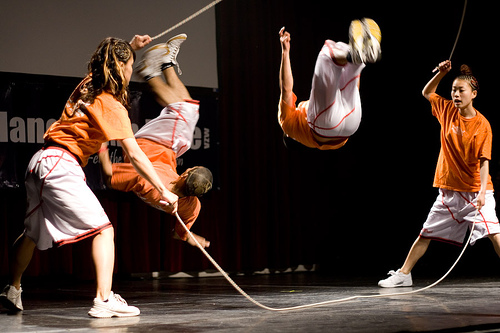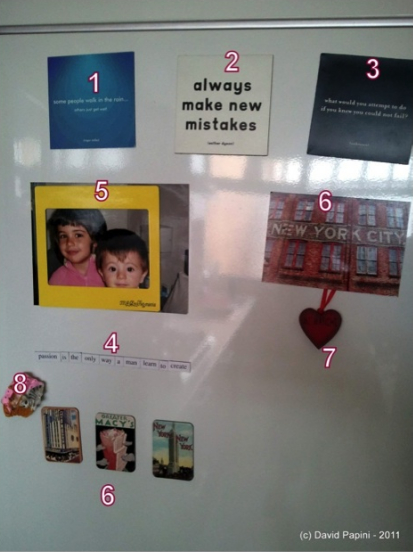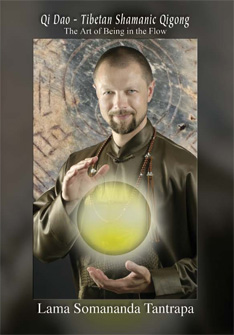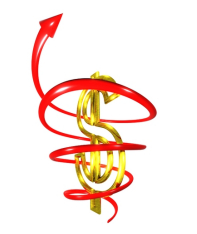
As a professional service provider, there are two things you must learn in order to succeed with coaching.
1. How to coach professionally: This includes polishing your coaching skills until you provide value worth approximately 10 times what your clients pay.
2. How to attract coaching clients: This includes filling your client roster for the first time (usually the toughest) and then keeping it full or even maintaining a waiting list of eager clients.
Obviously, #1, providing 10 times the value, will help you with #2. But did you know that #2, attracting lots of coaching clients, is the key to #1?
The data tell us that these two skills, delivering coaching value and attracting clients, comprise a constantly repeating feedback loop. One builds on the other and visa versa. That’s why some coaches are extraordinarily successful, while others seem to struggle forever.
You’ve got to step into that loop and stay there. Kind of like Double Dutch
If you learned Double Dutch as a kid, you know that just getting into the game is a challenge, especially for the newbie. It takes courage, lots of energy and great timing. And staying in the game requires 10 times as much of all three.
But that’s what makes it so darn fun.
You might not think that science and data are fun or even appropriate for coaching. After all, coaching done well is an art form. But when the data teach you what to do more of and what to do less in order to succeed quickly, you get more of what you want faster. And your clients get more value.
You’re in the loop. That’s more fun.
Unfortunately, most coaches, especially those who are new, do not have access to data that helps them get what they want. You need a large sampling from your own business to get actionable data that can guide you. This requires that you start experimenting early and often.
Think of experimentation as Play + Feedback = Rapid Growth.
I’ve recently collected data on 22 coaches who have participated in Coach 100 in the past year. Coach 100 is a long-term experiment that teaches coaches how to get clients by offering complimentary coaching sessions. This gives them a large enough sample to get actionable data.
Some Coach 100 coaches in my sample were brand-spanking new when they started the program. Others were long-time veterans. Collectively, they offered 464 complimentary sessions, or an average of 21 per coach. The most sessions offered was 106, by one coach, and the least, just 1 session each, by four coaches.
Between them, they got:
- 219 testimonials (gold, especially for the new coach who needs evidence to prove their ability)
- 75 referrals for potential clients (again, gold, especially when you’re building a new business)
- 162 clients (gold, period).
That’s more than seven clients, each, or one client for every three complimentary sessions. That’s the average. Interestingly, the newbie coaches did almost as well as the veterans, especially the ones who coached the most people. That suggests they're learning really fast.
Could you use 7 new coaching clients?
Of course part of the treasure that the coaches receive is in the feedback they get privately from each person they coach via their Coach 100 Feedback Survey.
Their individual feedback data help them:
a. find their niche and specialty, which makes future marketing much easier
b. helps them learn to sign on clients with finesse, which brings all-important income
c. helps them become master coaches and even get certified (remember: 10 times the value).
Last but not least, Coach 100 gets coaches into that all-important feedback loop where they’re playing full out and simultaneously learn to deliver amazing value, while attracting plenty of clients. That’s where extraordinary success happens. Why?
See those master Double Dutch players doing back flips, above?
They’re performing in exhibitions and competitions. Think they practice hundreds of hours for those events? If they want to win, they do. Think they hone their craft with the feedback they get during every competition? Again, if they want to win. Lots of practice, lots of events, lots of feedback (data). That’s how you master Double Dutch. That’s how you win.
Coaches need similar structures to get them into that feedback loop so they can master coaching sessions and master the science of getting coaching clients. The Coach 100 process does all that and gives a certification, too.
Could you coach 100 people without the program? Theoretically, yes, but I’ve never seen anyone do it. It helps to have a structure that streamlines the process and supports the coach through to the end. Coaches need structure and systems to succeed, just like their clients.
Want to win at master coaching sooner, rather than later?
You may want to join a small group of high performers who are focused on filling their client rosters in about three months. I’ll be your personal mentor coach.

Double Dutch photo by Pitslamp
 Yesterday my IAC Chapter hosted a call on how to keep IAC Life Coach Certification.
Yesterday my IAC Chapter hosted a call on how to keep IAC Life Coach Certification.


 Guest post by David Papini.
Guest post by David Papini.
 Guest post by David Papini.
Guest post by David Papini.


 Guest Blogger, Lama Somananda Tantrapa, is the holder of the lineage of Qi Dao that has been fostered in his clan for 27 generations since 1224 AD. He has over 30 years of experience in Qi Dao and other internal martial arts. After pioneering Qi Dao Coaching in 2000, he has provided wellness, peak performance and life coaching to hundreds of clients from all walks of life. His coaching has inspired many professional athletes, speakers, dancers, singers, writers and actors to open up to the infinite source of power that exists within everyone. Lama is Founder and Editor of
Guest Blogger, Lama Somananda Tantrapa, is the holder of the lineage of Qi Dao that has been fostered in his clan for 27 generations since 1224 AD. He has over 30 years of experience in Qi Dao and other internal martial arts. After pioneering Qi Dao Coaching in 2000, he has provided wellness, peak performance and life coaching to hundreds of clients from all walks of life. His coaching has inspired many professional athletes, speakers, dancers, singers, writers and actors to open up to the infinite source of power that exists within everyone. Lama is Founder and Editor of



 et 7 questions to banish your confusion about becoming a business or life coach.
et 7 questions to banish your confusion about becoming a business or life coach. Today one of my mentor coaching clients said something brilliant.
Today one of my mentor coaching clients said something brilliant. Gregory Schillinger was one of the first coaches to take a chance on School of Coaching Mastery three years ago.
Gregory Schillinger was one of the first coaches to take a chance on School of Coaching Mastery three years ago.
